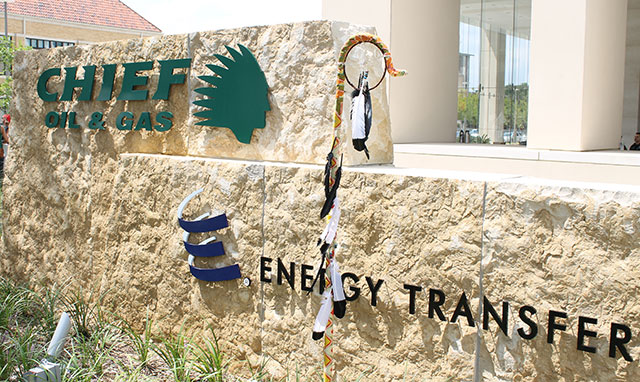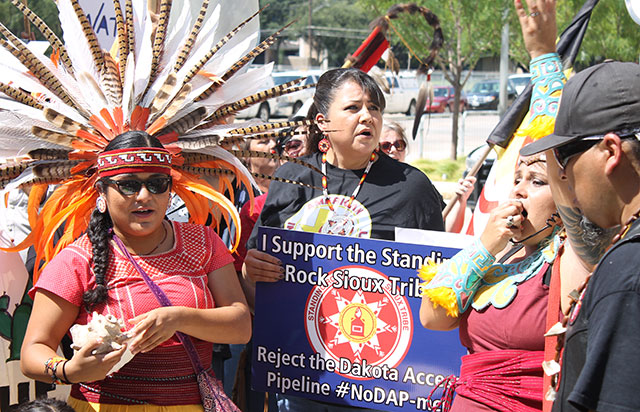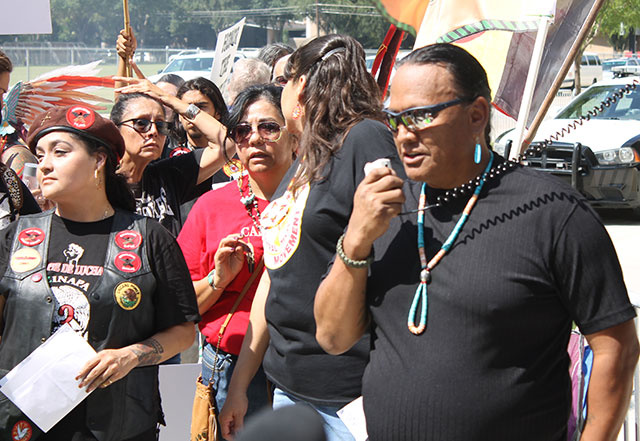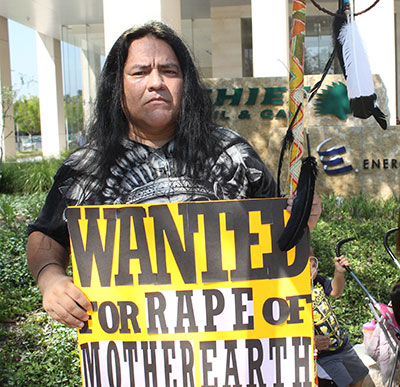
Part of the Series
Planet or Profit
Truthout is a vital news source and a living history of political struggle. If you think our work is valuable, support us with a donation of any size.
As members of more than 100 tribal nations continue their historic standoff against the Dakota Access Pipeline at the Standing Rock Sioux Reservation in North Dakota, Texas tribes protested in solidarity at the headquarters of the Dallas-based company behind the project — Energy Transfer Partners (ETP) — and spotlighted the company’s conflicts of interest and corrupt practices in their own state.
Just before poorly trained private security officers sicced dogs on Indigenous water defenders protecting sacred burial grounds in North Dakota over the weekend, Indigenous activists with the American Indian Movement of Central Texas (AIMCTX) gathered more than 1,000 miles away at the corporate headquarters of ETP in Dallas on September 2 to decry CEO Kelcy Warren’s “Black Snake” pipeline projects and pray in rhythm to Native drumsongs.

In North Dakota, more than 10 activists had briefly locked themselves to Dakota Access Pipeline bulldozers Thursday morning, but no work took place at the targeted sites. Also on Thursday, North Dakota Gov. Jack Dalrymple announced that the state’s National Guard would be activated to assist local police at the Standing Rock Sioux Reservation. Several armed guards will be dispatched at checkpoints along Highway 1806.
ETP’s Dakota Access Pipeline, if completed, is slated to carry Bakken crude from North Dakota through South Dakota, Iowa and to an Illinois distribution center, where at least some of its product will be sold to global markets after either being sent to East Coast refineries or down to the Gulf Coast via another pipeline that ETP is converting to transport oil.
In Texas, ETP is known to many Indigenous activists and far West Texas landowners as the company behind another planned project — the Trans-Pecos Pipeline — which will transport natural gas from West Texas to Mexico, again to be sold overseas.
The high-pressure Trans-Pecos Pipeline is currently under construction and is billed to stretch 143 miles from the Waha Hub at Coyanosa to the border near Presidio, Texas — cutting right through the heart of the Big Bend region, an ecologically sensitive bioregion that remains remote and breathtakingly wild, formerly untouched by oil and gas infrastructure.
“We consider this whole area sacred. This is sacred, pristine land out here, and there is a site that is going to be bulldozed pretty soon,” said Roberto Lujan, a Jumano-Apache resident of what he calls the “La Junta,” or Presidio area, just 12 miles from the pipeline’s projected path. He made the long drive to Dallas last Friday to protest with more than 200 others at ETP’s corporate headquarters.
Located in northeastern Brewster County, the site that is in danger of being bulldozed was recently identified by a team of archeologists as containing prehistoric artifacts. Archeologist David Keller told Marfa Public Radio that the sites include several “ancient bedrock grinding features,” used by ancient peoples to grind food. Activists with the Big Bend Conservation Alliance warn that the site may soon be desecrated — much like the Standing Rock Sioux’s sacred burial grounds were over the weekend — by the pipeline’s impending clear-cutting and trenching work.
Keller previously told Truthout staff reporter Dahr Jamail that ETP has only tested for cultural artifacts one foot beneath the topsoil; yet, many artifacts and relics in the area of the floodplain of the Rio Grande are at least three feet beneath the surface.
“This [gas] boom … will create havoc for this … Chihuahuan desert ecosystem and the use of water in this desert,” Lujan told Truthout. “This is going to change this place completely for generations on forward…. Accountability is going to have to be there to preserve some of this land.”
Indigenous activists with AIMCTX called attention to other Texas fossil fuel infrastructure projects last Friday, including the Mexican-owned Dos Republicas coal mine in Eagle Pass, Texas. The company that runs the mine has razed land where ancient artifacts and Indigenous people are buried.
“This is the land of my ancestors. This is all that we have. There are many sacred sites that are on this continent that do not need to be touched, and that needs to be respected,” said Yolanda Bluehorse, a member of the Rosebud Sioux Tribe of South Dakota who co-organized the Dallas protest with AIMCTX. “The treaties that were signed with the U.S. government a long time ago have been broken time and time again, but this time we are putting our foot down and saying no more.”

Organizers and Indigenous activists are planning solidarity actions targeting the Dakota Access Pipeline’s corporate ties and funders in cities across the nation in the coming weeks, highlighting an expanding list of targets for direct action or other nonviolent tactics to pressure pipeline power-brokers for accountability.
Investigations by LittleSis and Food and Water Watch reveal that 38 banks have extended more than $10.25 billion in loans to fund the Energy Transfer family of companies behind the pipeline, which include ETP, Energy Transfer Equity, Sunoco Logisitcs and Dakota Access LLC. Additionally, Canada’s largest pipeline company, Enbridge, with the Texas-based Marathon Petroleum Corporation put down $2.6 billion last month to become joint stakeholders of 49 percent of the Dakota Access Pipeline. Phillips 66 also owns another 25 percent stake of the pipeline.
Seventeen major banks are backing Dakota Access LLC directly with a $2.5 billion credit line to build the pipeline. Major funders include Citibank, Wells Fargo, BNP Paribas, SunTrust, Royal Bank of Scotland, Bank of Tokyo-Mitsubishi, Mizuho Bank, TD Securities, ABN AMRO Capital, DNB First Bank, ICBC London, SMBC Nikko Securities and Société Générale.
Twenty-six banks have extended a $3.75 billion credit line to ETP for the expansion of its oil and gas infrastructure holdings, and many of the same banks are extending another $1.5 billion of credit to Energy Transfer Equity.
While activists across the country will be busy targeting strategic sites involving these funders with nonviolent tactics in the coming weeks, another potential target for accountability and member of ETP’s board of directors hasn’t just flown under the radar — rather, he’s remained in the spotlight since announcing that he’ll be joining the next season of the popular reality show “Dancing With the Stars.”
ETP CEO Kelcy Warren has paid a pretty penny to maintain relationships with powerful Texas politicians, including former Texas Gov. Rick Perry — whom ETP now showcases on the company’s board of directors. Warren was one of the top two backers of Perry’s super PAC supporting his second unsuccessful presidential bid this election cycle, giving more than $6 million to the Opportunity and Freedom PAC — 24 times his previous contribution of $250,000 to another PAC backing Perry’s 2012 presidential bid, according to the Center for Responsive Politics.
Moreover, Texans for Public Justice has noted that Warren and his company’s PAC has given more than $223,000 in campaign donations to the three Republicans on the Texas Railroad Commission, the state’s oil and gas regulatory commission.
Warren has also given more than $500,000 to the state’s current governor, Greg Abbott, during his gubernatorial campaign, and a combined $30,000 to Abbott’s 2006 and 2010 campaigns for state attorney general, according to the Texas Ethics Commission.
Governor Abbott has since made a return on Warren’s investment, appointing him to the Texas Parks and Wildlife Commission through January 2021, and appointing his wife, Amy Warren, a former ETP executive assistant, to a board seat on Humanities Texas.

“We’re confronted by the ‘good ol’ boys’ system here in Texas, that gas and oil controls the state, controls all the agencies. Corporations control what Texas does. You can see it in that example [of Rick Perry being on ETP’s board],” Lujan told Truthout. “Good ol’ boys appoint good ol’ boys.”

ETP seems to be following the same playbook that TransCanada (the company behind the more infamous Keystone XL pipeline) used to quell protesters using direct action tactics to block construction along the route of the pipeline’s southern leg. Both companies have hired private security officers who used pepper spray against peaceful blockaders defending the land.
“They have subcontractors for people to do their bidding, and so consequently, nobody wants to be held accountable. So it’s basically passing on the buck,” Lujan said.
It was a bad ethical and public relations strategy for TransCanada then, and it’s a bad ethical and public relations strategy for ETP now.
“Our spirituality is dependent on the land, the water, the air. That is our quote-unquote, religion, and this is what our ancestors died for,” Bluehorse told Truthout. “What [the oil companies] will leave for even their own grandchildren and their great-grandchildren and their bloodlines is the destruction of this land.”
Holding Trump accountable for his illegal war on Iran
The devastating American and Israeli attacks have killed hundreds of Iranians, and the death toll continues to rise.
As independent media, what we do next matters a lot. It’s up to us to report the truth, demand accountability, and reckon with the consequences of U.S. militarism at this cataclysmic historical moment.
Trump may be an authoritarian, but he is not entirely invulnerable, nor are the elected officials who have given him pass after pass. We cannot let him believe for a second longer that he can get away with something this wildly illegal or recklessly dangerous without accountability.
We ask for your support as we carry out our media resistance to unchecked militarism. Please make a tax-deductible one-time or monthly donation to Truthout.